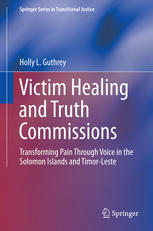

Most ebook files are in PDF format, so you can easily read them using various software such as Foxit Reader or directly on the Google Chrome browser.
Some ebook files are released by publishers in other formats such as .awz, .mobi, .epub, .fb2, etc. You may need to install specific software to read these formats on mobile/PC, such as Calibre.
Please read the tutorial at this link: https://ebookbell.com/faq
We offer FREE conversion to the popular formats you request; however, this may take some time. Therefore, right after payment, please email us, and we will try to provide the service as quickly as possible.
For some exceptional file formats or broken links (if any), please refrain from opening any disputes. Instead, email us first, and we will try to assist within a maximum of 6 hours.
EbookBell Team

0.0
0 reviewsThis book intends to contribute to the growing body of transitional justice literature by providing insight into how truth commissions may be beneficial to victims of mass violence, based on data collected in Timor-Leste and on the Solomon Islands. Drawing on literature in the fields of victim psychology, procedural justice, and transitional justice, this study is guided by the puzzle of why truth-telling in post-conflict settings has been found to be both helpful and harmful to victims of mass violence. Existing studies have identified a range of positive benefits and negative consequences of truth-telling for victims; however, the reasons why some victims experience a sense of healing while others do not after participating in post-conflict truth commission processes continues to remain unclear. Hence, to address one piece of this complex puzzle, this book seeks to begin clarifying how truth-telling may be beneficial for victims by investigating the question: What pathways lead from truth-telling to victim healing in post-conflict settings? Building on the proposition that having voice—a key component of procedural justice—can help individuals to overcome the disempowerment and marginalisation of victimisation, this book investigates voice as a causal mechanism that can create pathways toward healing within truth commission public hearings. Comparative, empirical studies that investigate how truth-telling contributes to victim healing in post-conflict settings are scarce in the field of transitional justice. This book begins to fill an important gap in the existing body of literature. From a practical standpoint, by enhancing understanding of how truth commissions can promote healing, the findings and arguments in this volume provide insight into how the design of transitional justice processes may be improved in the future to better respond to the needs of victims of mass violence.